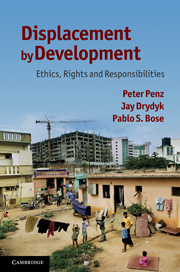PART III - FROM VALUES TO RESPONSIBILITIES
Published online by Cambridge University Press: 05 June 2012
Summary
Part III is a bridge leading from the development ethics framework towards a specific division of responsibilities regarding displacement by development – responsibilities falling upon developers, states, funders, stakeholders, non-governmental or civil-society organizations, community representatives, media, and others. We begin by addressing some central dilemmas. Chapter 7 focuses on equity of outcomes: if displacement-prone development is stopped, its intended beneficiaries may be kept in poverty, whereas if it is allowed to proceed, the oustees risk impoverishment. Resolving this, we argue, requires that displacement and resettlement must first of all identify affected persons so as to compensate them, reduce hardships, and include them in the distribution of benefits. Chapter 8 focuses on a dilemma of process: should all displacement for development be voluntary, with free and informed consent of those being displaced? If so, then what is to prevent wealthy and more powerful landowners from exerting their greater influence to extract high prices for their own lands, at the expense of poorer oustees – or even to block a project at the expense of others who may depend on the project to overcome hardships? If consent is not required, then is this not incompatible with security of tenure over dwellings, as a component of the right to adequate housing? To resolve this, we consider whether consent is an appropriate ethical standard for displacement. Finding that it is not an appropriate overall standard, we find nevertheless that there are some conditions in which displacement should not be forced.
- Type
- Chapter
- Information
- Displacement by DevelopmentEthics, Rights and Responsibilities, pp. 153 - 156Publisher: Cambridge University PressPrint publication year: 2011

